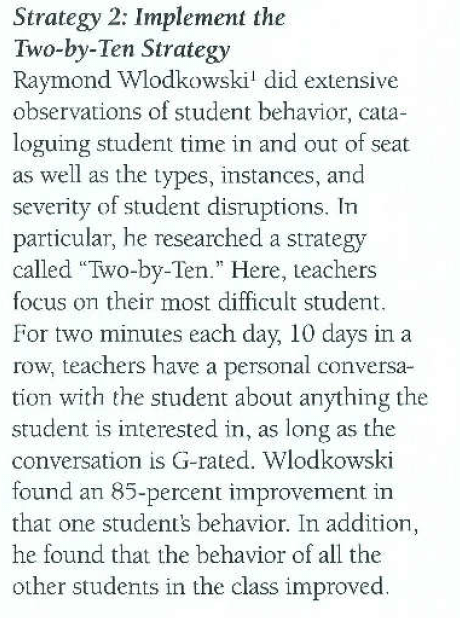“Though well intentioned, the ‘colorblind’ approach inhibits the ability of White communities to understand the social experiences of racial microaggressions, Continue reading “Colorblindness” and white privilege
Category Archives: Creating Classroom Community
Interpersonal Interactions with Students

I think classroom management is one of the most difficult tasks that teacher needs to accomplish in the classroom. Having different strategies to teach appropriate behavior during a lesson is key to keep students on task and engaged. The 2 by 10 strategy presented by Smith and Lambert (2008) can be very helpful to address the student(s) who have the most behavioral problems. Interacting on a personal level with the student for two minutes before classroom time for 10 days helps build better rapport with the student. By applying this strategy, according to Smith and Lambert’s (2008) observations, it improved students’ behavior during a lesson. I will like to apply this strategy in the classroom since most if not all students care about being acknowledged beyond their academic performance. I also believe that this technique can be apply to all students in the classroom and build a stronger community in the classroom.
Thinking about “Colorblind Racism” and Microagressions
“All focus group participants discussed experiencing various forms of racial microaggressions. Some of the injuries were related to a sense that many White people in the community pretend not to notice race or color and will do or say hurtful things without realizing that they are causing injury.”
(Yull et al. 2014)
I found this particularly interesting, as there does seem to be a sort of myth floating around that pretending to ignore race altogether means one cannot be racist (or say or do anything that could be considered racist.) Continue reading Thinking about “Colorblind Racism” and Microagressions
I hate that I’m white
Teachers are often White women whose own educational and life experiences are considerably different from the students in urban schools, and teacher education may not include developing skills that prepare them for racial and cultural diversity (Wiggins, Follo, & Eberly, 2007).
Cited from Yull, Blitz, Thompson & Murray, 2014, pg. 13
I read this particular quote, as I have read many others of a similar nature, and I just feel so crushed. I am a White woman whose personal and educational background, in many ways, should “disqualify” me from being able to educate brown children. I didn’t grow up in an urban community and my parents admittedly sheltered me from any diversity they could. “On paper”, so to speak, I have no reason to possess any skills that empower me to teach children from racially and culturally diverse backgrounds. However, somewhere along the way, Continue reading I hate that I’m white
Please care for us today
“Our students’ behavior will begin to reflect these positive assumptions. What shifts is the how-the manner in which we communicate”.
We recite little empty sentences to ourselves and repeat them to our kids everyday: “you can do anything you want to do”, “you can be who you want to be”, “search your goal and seize it”, “you can change the world”, “all it takes is perseverance (grit)”. These are like the no-words: important, difficult, thing, some, …. little fillers we like to fabricate to stop voids from expanding and lies to unfold. The movement from the ethereal of these words and expressions toward the hands on dough mixing deal, now that’s tough. The strategies in this reading do exactly that. They fill the void with yummy Nutella, meaning actual meaning, actual doing, actual actions. These practical guidelines as well as the focal learner project, are exactly what teachers need to see and live in their process of learning and becoming school community builders. This is me looking at their humanity and therefore mine in the face, accepting that we have a purpose that shares the same space and we should therefore care for each other every second until dismissal and beyond. That’s the life skill that should be modeled, concluded and practiced daily.